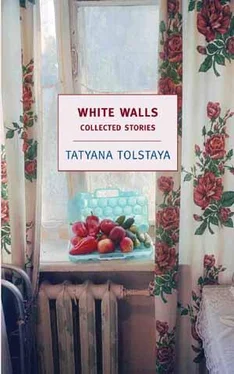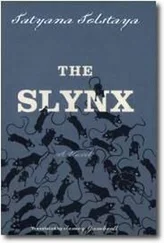Thousands of years, thousands of days, thousands of translucent impenetrable curtains fell from the heavens, thickened, turned into solid walls, blocked roads, and kept Alexandra Ernestovna from going to her beloved, lost in time. He remained there on the other side of the years, alone at the dusty southern station, wandering along the sunflower seed-spattered platform; he looks at his watch, kicks aside dusty corn cobs with his toe, impatiently tears off blue-gray cypress cones, waiting, waiting, waiting for the steam engine to come from the hot morning distance. She did not come. She will not come. She had deceived him. But no, no, she had wanted to go. She was ready, and the bags had been packed. The white semitranspar-ent dresses had tucked up their knees in the cramped darkness of the trunk, the vanity case’s leather sides creaked and its silver corners shone, the shameless bathing costumes barely covering the knees—baring the arms to the shoulder—awaited their hour, squinting, anticipating… In the hat box—impossible, enticing, insubstantial… ah, there are no words to describe it —white zephyr, a miracle! On the very bottom, belly-up and paws in the air, slept the sewing box—pins, combs, silk laces, emery boards of diamond sand for delicate nails; trifles. A jasmine genie sealed in a crystal flask—ah, how it would shine with a billion rainbows in the blinding seaside sun! She was ready—but what interfered? What always interferes? Well hurry, time’s passing—Time’s passing, and the invisible layers of years get thicker, and the rails get rusty, and the roads get overgrown, and weeds grow taller in the ravines. Time flows and makes sweet Shura’s boat bob on its back and splashes wrinkles into her incomparable face.
…More tea?
After the war she returned—with her third husband—here, to these rooms. The third husband kept whining, whining.… The corridor was too long. The light too dim. The windows faced the back. Everything was behind them. The festive guests died out. The flowers faded. Rain hammered at the windows. He whined and whined and died, but when and of what, Alexandra Ernestovna did not notice.
She got Ivan Nikolayevich out of the album, and looked at him a long time. How he had begged her! She had even bought a ticket—and here it was, the ticket. Hard cardboard—black numbers. If you want, look at it this way, if you want, turn it upside down. It doesn’t matter: forgotten signs of an unknown alphabet, a coded pass to that shore.
Maybe if you learn the magic word… if you guess it; if you sit down and think hard, or look for it… there has to be a door, a crack, an unnoticed crooked way back there to that day; they shut up everything but they must have missed a crack somewhere: maybe in some old house, maybe if you pull back the floorboards in the attic—or in a dead end, or in a brick wall, there’s a passage carelessly filled with bricks, hurriedly painted, haphazardly nailed shut with crisscrossed boards…. Maybe not here but in another city… Maybe somewhere in the tangle of rails on a siding there stands a railroad car, old and rusted, its ceiling collapsed: the one sweet Shura didn’t get into?
“There’s my compartment… Excuse me, I’ll get by. Wait, here’s my ticket—it says so right here.” There, down in that end—rusted shock absorbers, reddish buckled wall girders, blue sky in the ceiling, grass underfoot—that’s her place, right here! No one ever took it, no one had a right.
…More tea? A blizzard.
…More tea? Apple trees in bloom. Dandelions. Lilacs. Oof, it’s hot. Leave Moscow—to the seaside. Until our next meeting, Alexandra Ernestovna. I’ll tell you all about that part of the world. Whether the sea has dried up, whether the Crimea floated away like a dry leaf, whether the blue sky has faded. Whether your tormented, excited beloved has deserted his volunteer post at the railroad station.
In Moscow’s stony hell Alexandra Ernestovna waits for me. No, no, it’s all true! There, in the Crimea, the invisible but agitated Ivan Nikolayevich—in white uniform—paces up and down the dusty platform, digs his watch out of his pocket, wipes his shaved neck; up and down along the lattice work fence rubbing off white dust, oblivious and agitated; past him, without noticing, go beautiful, large-faced young women in trousers; hippie boys with their sleeves rolled up, enveloped in transistorized badoobadooms; farm women in white scarves with buckets of plums; southern ladies with plastic earrings; old men in unyielding synthetic hats; smashing right through Ivan Nikolayevich, but he doesn’t know, doesn’t notice, doesn’t care, he’s waiting, time has been derailed, stuck midway somewhere outside of Kursk, tripped on nightingale rivers, lost, blind in fields of sunflowers.
Ivan Nikolayevich, wait! I’ll tell her, I’ll give her the message; don’t leave, she’ll come, she’ll come, honest; she’s made up her mind, she’s willing, just stand there, don’t worry, she’ll be here soon, she’s packed, she just has to pick it up; she’s even got a ticket: I swear, I’ve seen it—in the velvet album tucked behind a photograph; it’s a bit worn of course, but don’t worry, I think they’ll let her on. There’s a problem back there, something’s in the way, I don’t remember what; but she’ll manage, she’ll think of something—she’s got the ticket, doesn’t she?—that’s important, the ticket, and you know the main thing is she’s made up her mind, it’s certain, I’m telling you.
Alexandra Ernestovna’s signal is five rings, third button from the top. There’s a breeze on the landing: the dusty stairwell windows are open, ornamented with easygoing lotuses—the flowers of oblivion.
“Who?… She died.”
What do you mean… just a minute… why?… I just… I just went there and came back. Are you serious?…
The hot white air attacks you as you come out of the passageway crypt, trying to get you in the eyes. Wait… The garbage probably hasn’t been picked up, right? The spirals of earthly existence end around the corner on a patch of asphalt, in rubbish bins. Where did you think? Beyond the clouds, maybe? There they are, the spirals—springs sticking out from the rotting couch. They dumped everything here. The oval portrait of sweet Shura—the glass broken, the eyes scratched out. Old woman’s rubbish—stockings… The hat with the four seasons. Do you need chipped cherries? No? Why not? A pitcher with a broken-off spout. The velvet album was stolen. Naturally. It’ll be good for polishing shoes. You’re all so stupid, I’m not crying. Why should I? The garbage steamed in the hot sun and melted in a black banana ooze. The packet of letters trampled into slush. “Sweet Shura, when will you?” “Sweet Shura, just say the word.” And one letter, drier, swirls, a yellow lined butterfly under the dusty poplar, not knowing where to settle.
What can I do with all this? Turn around and leave. It’s hot. The wind chases the dust around. And Alexandra Ernestovna, sweet Shura, as real as a mirage, crowned with wooden fruit and cardboard flowers, floats smiling along the vibrating crossing, around the corner, southward to the unimaginably distant shimmering south, to the lost platform, floats, melts, and dissolves in the hot midday sun.
Translated by Antonina W. Bouis
On the golden porch sat:
Tsar, tsarevich, king, prince,
Cobbler, tailor.
Who are you?
Tell me fast, don’t hold us up.
—Children’s counting rhyme
IN THE beginning was the garden. Childhood was a garden. Without end or limit, without borders and fences, in noises and rustling, golden in the sun, pale green in the shade, a thousand layers thick—from heather to the crowns of the pines: to the south, the well with toads, to the north, white roses and mushrooms, to the west, the mosquitoed raspberry patch, to the east, the huckleberry patch, wasps, the cliff, the lake, the bridges. They say that early in the morning they saw a completely naked man at the lake. Honest. Don’t tell Mother. Do you know who it was?—It can’t be.—Honest, it was. He thought he was alone. We were in the bushes.—What did you see?— Everything.
Читать дальше












